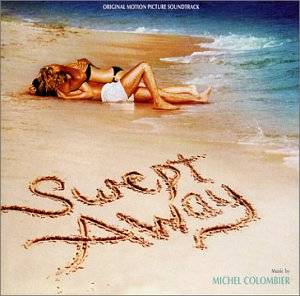Swept Away
Music composed by Michael Colombier
"Come-On-A-My House" performed by Delle Reese
Bouzouki and various Greek instruments - John Themis
Violin Rolf Wilson
Cello Anthony Pleeth
Piano David Hartley
Available on Varèse Sarabande Records (VSD-6415)
Running Time: 43:36
Crotchet Amazon UK Amazon US

French composer, Michel Colombier has been writing music for films since 1965 (L'Arme à Gauche). Much of his work has been for American films including White Nights (1985); Deep Cover (1992) and the oddly entitled How Stella Got her Groove Back (1998). Halliwell's Who's Who in the Movies does not give one accolade to any of the 34 scores listed under his name. His score for Swept Away starring Madonna as a beautiful but spoilt socialite, stranded on a Mediterranean island with a communist sailor, might not convince Halliwell either. It is slight but amiable. Divorced from the film, this album could be filed under easy listening.
The opening track 'The Greeks' revisits Zorba using varying tempi and colorations. 'The Gym' follows in similar light-hearted vein. For the opening of 'Montage' there is that current cliché, a solo piano pitched in a remote key to signal isolation, but the track is saved by glittering development work for the piano over warm string tones.
'Pensive' is just that, plucked very briefly from a guitar. 'Night in a dinghy' is a nicely shaped nocturne with an oboe sailing romantically above softly throbbing lower string ostinati, with a brief episode featuring steel drums and harmonica. 'Land' brings a rush of excitement and the 'The Island' adds a blush of romantic thrill that spills over to 'Separate Ways'. Nice atmospheric use is made of Greek ethnic instruments to add colour to the lyricism of Colombier's strings through these latter tracks. 'Beach confrontation' is a combative exercise for timps and savage string staccatos. 'Togetherness' is a tentative, repetitive minimalist dialogue, almost static, between piano and fiddle – with little modulation and development through its 4½-minute duration making it seem endless. 'First Boat' and 'Rescued' take the becalmed music forward through faster tempi, the latter restoring the Greek element and adding a touch of regret to the romantic theme as if the rescue was not entirely welcome. 'Alone' is another clichéd string evocation of sighing and yearning, supported by prolonged Greek instrumental thrumming. 'Phone-call' has meditative celli and clarinet that continues the yearning rather prettily with soft synths pushing towards some urgency. The final 'Parted' carries on in the same vein over six tedious minutes but with the piano meandering and solo cello. Della Reese sings a blasé up-dated version the old Rosemary Clooney classic 'Come-on-a-my-house' – come back Rosie!
Routine romantic score just about saved from longueurs by some Greek colourings.
Ian Lace
2½
Return to Index